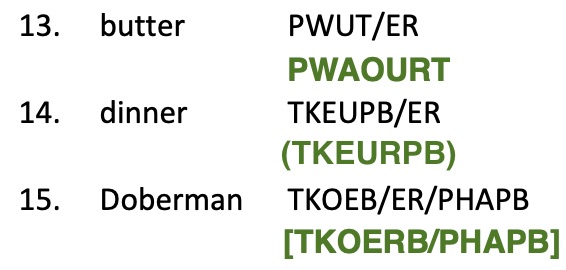It took nearly 4 months, but I finally finished Platinum Steno’s video theory lessons.
It was a tough marathon, and there were many times where I had to drag myself huffing and puffing through the motions to just get to the end of a lesson.
Ultimately, though, I think it was absolutely worth it. So, I would like to spread the word about these great lessons, but also provide some commentary, from the point of view of a hobbyist, about where I think they best fit in a steno learner’s itinerary.
Background
Platinum Steno (PS) is (was?) a provider of paid educational and training material for court reporters. In February 2021, they released their entire catalogue of stenography theory and speed-building videos to their YouTube channel, and made the complementary lesson materials and worksheets freely available to download from their website (though you do need to go through a checkout process for $0 to get each lesson’s materials).
This post on their Facebook page would seem to explain some of the motivations for making their content widely available:
This content should not be used to replace your existing school or program. Our intention in releasing this content was never to compete with existing programs. We decided to release this material because we felt that everyone could benefit from it, especially if it was free to the students. […] No matter where you are in your journey, we believe the content is valuable and can have a place in your practice sessions.
Being a computer programmer that loves open-source software, and whose steno theory of choice is the free and open Plover theory, I love this sentiment and can definitely get behind it! With regards to being able to use the content “no matter where you are in your journey”, though, I think there are a few caveats here that are worth making more explicit.
Open Content, Closed Theory
From what I understand from conversations on the Plover Discord, the PS theory lessons use a “modified StenEd” theory (Plover also “has its roots in StenEd”, so there is some overlap between it and PS).
Looking on the StenEd website, you can see that there are lots of options to buy various books and audio material. If you are a beginner, and just want to try steno before making any big monetary investments, you may think you could bypass these purchases for now, and just start learning via the YouTube videos.
However, you now have some new questions:
- Where will you get the StenEd dictionaries that map the steno outlines you find in PS’s worksheets to their English words? PS’s “modified” theory would seem to indicate there is a level of customisation to their dictionaries that would be unique to them (and hence may not be in any “official” StenEd dictionaries you could buy), and those dictionaries do not seem to have been released alongside their video lessons.
- Where will you get the software that will translate your chorded StenEd keyboard strokes into English output? The lessons make mention of special, presumably also custom, software, which, along with chord translation, handles specific situations like chording large numbers, currency, and legal Q&A exercises (more about that later); this software also does not seem to have been released publicly.
- Even if you did find that software, will it run on your computer, or do you need an expensive stenotype machine to run it?
If you have made the plunge to formally enrol in a steno school which uses StenEd theory, then perhaps all of the issues outlined above are irrelevant, and you can, indeed, easily augment your studies with PS’s materials. This is fantastic! Definitely go for it (and feel free to ignore most of the rest of this post)!
Delayed Gratification
If you are going to go the open and free route with learning steno as a beginner, then Plover theory is currently your only viable choice. This is not a bad thing (I ![]() Plover!), and I think the theory that the PS lessons use is not really important compared to the value provided by their content.
Plover!), and I think the theory that the PS lessons use is not really important compared to the value provided by their content.
Although Plover theory and its software, can enable you to attempt the lessons without any upfront monetary cost (assuming you already have an N-Key Rollover-compatible keyboard), I believe a cost is borne in the timing that you can reasonably start studying them, which is not at the very beginning of your steno journey.
Therefore, I would suggest forgetting PS for now, and instead focus on just learning Plover theory, to the point where you understand it intuitively.
Read one or both of Learn Plover! and Art of Chording (both recommended!), and get lots of steno practice in using applications like Typey Type, or any one of the many resources listed on Plover’s Learning Resources Wiki page.
This will probably take you a few months at the very least, so go off and have fun learning! The rest of this post will happily wait for your return…

…Welcome back! You now have a high degree of fluency in Plover, and have had lots of practice chording keystrokes, right? Great! Time to re-consider looking at PS theory lessons!
Wait, I’m recommending that you go back to theory? Didn’t you do all that already? Yes, you did! The core steno theory concepts in PS will end up just being revision for you, and the fact that they use StenEd theory will now not be a cause for any potential confusion thanks to your solid foundation in Plover! So, you will be able to focus more on the content that the PS theory lessons provide that I think is unique to them.
Platinum Club Benefits
The most important elements in determining the success of any educational courses are its delivery and content, and PS excels in both of these areas.
Delivery
Jill Paxton-Brumund, the teacher of the theory lessons, is absolutely fantastic!
Jill’s kind-yet-no-nonsense approach made learning with her a pleasure. Her explanations of steno outlines, stories from the trenches of court reporting, and even the way she read dictation exercises to prompt you to recognise when you could use a stroke-saving brief, were all massively helpful and interesting.
Learning steno is hard, and can be a grind, and Jill is unapologetic in telling you that if you are having trouble learning or remembering outlines, or chording particular keystrokes, to just go back and re-practice things multiple times until they sink in.
I felt like Jill was my steno gym coach, encouraging me to do those extra repetitions to build up muscle memory, and rooting for me to succeed. Thank you, Jill!
Content
During the course of the lessons, I definitely got some value out of doing more in-depth revision of core steno concepts. More importantly, though, the lessons served as motivation for creating my own learning materials, and broadening my knowledge of steno:
- The lessons contained a lot of vocabulary, including proper nouns, that I had not encountered in Plover learning materials, and in some cases were not contained in the default Plover dictionary. This became the catalyst for the creation of my personal dictionaries: to augment what Plover provided with outlines that made sense to me.
I would either take outlines directly from the PS lessons that I liked and put them in my dictionaries, or just make up outlines for new words that felt “Plover-esque” to me (doing Plover theory first helped me gain the intuition and confidence to do that). -
As I went through each lesson, I took the time to annotate each of the vocabulary outlines on the PS written materials with the Plover equivalents which blew out the time to finish each lesson significantly for me (feel free to do this mentally if you wish…). Sometimes, the outlines for StenEd and Plover would be the same, but when they were not, I used the following note style:

- An outline written as-is under a word would signify that the PS outline cannot be used in Plover, and the new outline must be used. In this case,
PWUT/ERis not a valid outline for “butter” in Plover theory, so I chose my preferred Plover outline to put here:PWAOURT(though the*-flaggedPWUT/*ERis valid in Plover). - An outline written in parentheses,
(), indicates that the PS outline is valid in Plover, but I personally prefer a different one. In this case,TKEUPB/ERalso maps to “dinner” in Plover theory, but I prefer the single-strokeTKEURPB. - An outline written in square-brackets,
[], indicates that the actual word does not exist in the default Plover dictionary, and so a custom outline was required to be created. As of this writing, Plover has no entry for “Doberman”, and although I could have used the providedTKOEB/ER/PHAPBoutline since it looks reasonable, I decided to create a new one to shave off a stroke:TKOERB/PHAPB.
- An outline written as-is under a word would signify that the PS outline cannot be used in Plover, and the new outline must be used. In this case,
- There is a lot of emphasis in the PS lessons on being able to stroke basic multi-word briefs with a single chord (eg “I have”, “did you”, “that he was”, “do you have the” etc). As well as building muscle memory in areas that will assist in getting higher speeds, this led to the addition of over 150 new phrase briefs to my personal dictionaries, so I hope they’ll serve me well (and maybe even you?) in the future.
- I learned about the concept of Q&A, which took the form of dictation exercises involving legal cross-examination of witnesses by attorneys in a courtroom setting.
I am not training to be a court reporter, but I had fun learning all about the conventions around writing up a legal record, including the formatting, how to “check in” attorneys with “by-lines” before they start questioning a witness, and just how the documentation of various participants in a conversation occurs (I have no idea how much commonality there is between different types of courts around the English-speaking world for legal record writing conventions).
If, like me, you think of learning steno like learning another language, I think that the Q&A parts of the PS lessons could be considered their “cultural studies”. You will rarely learn a human language in isolation from all the cultural elements that helped form and shape it, and I believe this to be the case with Q&A as well, given steno’s long history with the legal profession.
I also made a Q&A dictionary that, I believe, can help Plover mimic the software that PS uses for this. Hopefully it can be of assistance to any Plover users who also decide to learn some Q&A!
UPDATE 3 Oct 2021: I wrote in-depth about doing Q&A with Plover in another blog post, Plover for the Record.
Conclusion
If you are a Plover steno learner looking for more educational materials after working your way through other community-created texts, then you cannot go wrong with PS’s theory lessons, especially given that there is now no barrier to entry.
Personally, I am still on the PS bandwagon, and have started going through their speed classes, starting at 60 words-per-minute. It is tough, even now, but I consider it to be just another stage of the marathon I am happily running as part of my steno journey.
Thanks to Platinum Steno for providing such a great cache of material to budding learners of stenography, and I look forward to being able to gradually improve past my QWERTY speeds, and beyond!
UPDATE 30 October 2022: Platinum Steno Dictionary Released! 
On 12 October 2022, Platinum Steno released their Platinum Steno Theory Dictionary (NCRS Theory) as a Rich Text Format (.rtf) file. Like the rest of the lesson materials, you can just go through their checkout process for $0 to get it.
The Plover application understands RTF files, so once you have downloaded the dictionary, you can click the “Add Dictionaries (+)” button on the Plover main window to load it in and use it.
If you want to examine the dictionary entries in a more human-readable way, you can export them as a JSON (JavaScript Object Notation) file in the following way:
- Clicking the imported dictionary entry in the Plover main window
- Open Plover’s
Editmenu - Select “
Save Dictionaries as...”, then “Create a copy of each dictionary” - Select “
JSON dictionaries (*.json)” from the file type dropdown menu
Once you have generated the JSON file, you should be able to open it up with your favourite text editor.
Personally, I will still be sticking with Plover theory, but will very likely cherry-pick entries from the PS dictionary that resonate with me, and add them to my custom dictionaries.




Leave a comment